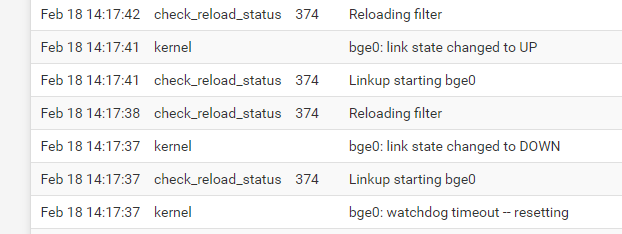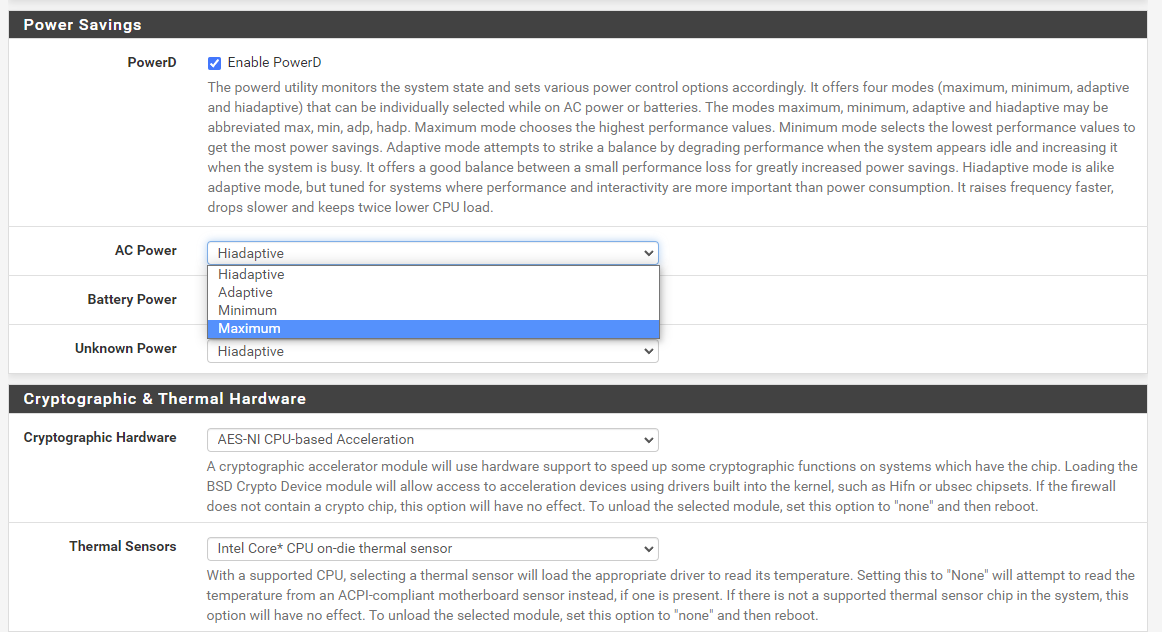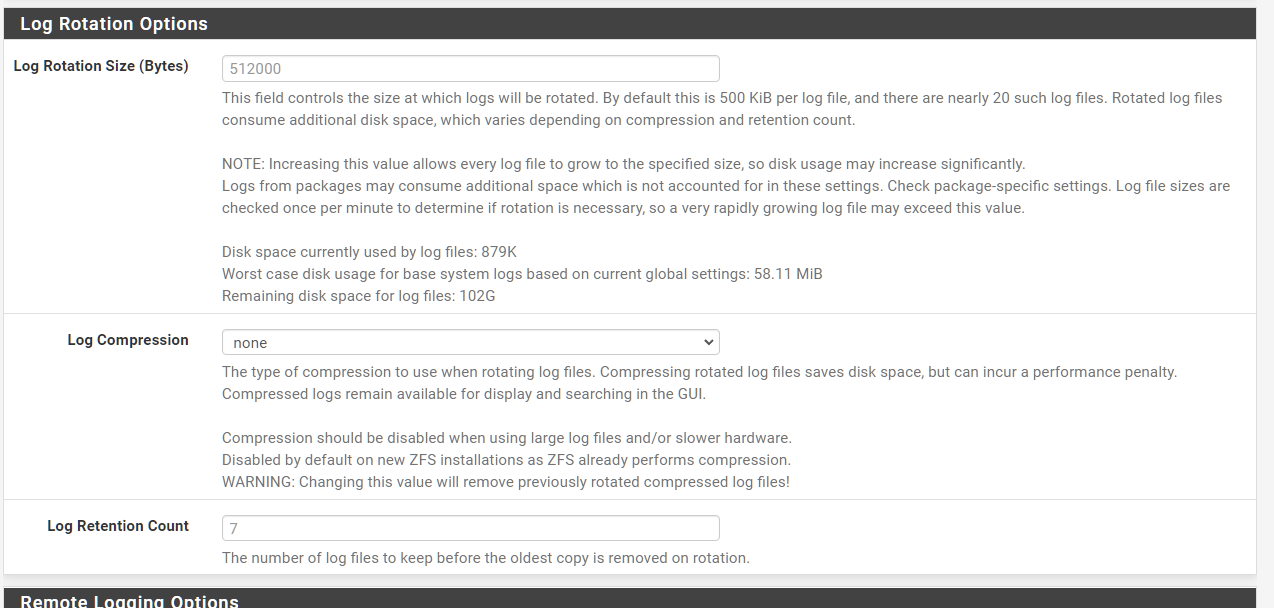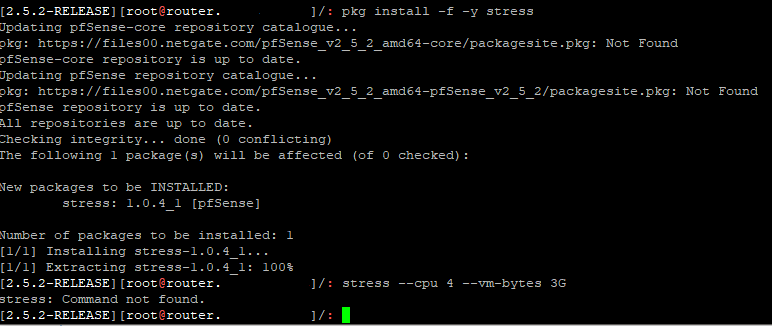-
@w0w Thank you!
I'l try this soon. "I am afraid my famlily is going to kill me" if i do it right now
-
@gerard64, one of @w0w 's post prompted a thought (the commands he pasted, some have to do with power)...
What are the power settings you have in System > Advanced> Miscellaneous? With the high CPU utilization, you may want to play with it a bit. How does the system CPU respond if Enable PowerD is checked, and all choices are set to Hiadaptive? (assuming it is not set that way already....)
Also, I would still use the package install command(s) @w0w recommended, even if you stay on 2.5.2 for a while...it does seem to be nicely stable, and "better" than the "built in" drivers.
-
Thank you for the updated instructions for the installation package.
This resolved my issue in 2.6.0 since I forgot to do it.
It reminded me to look at my "pfsense upgrade notes" text file, which had the drivers mentioned among other things I forgot to configure for my slow n3450 zotac with realtek nics.
-
-
The RealTek onboard NIC works under 2.5.2, i am currently running, normally.
After I added the extra RealTek NIC commands in /boot/loader.com lsast night nothing changed.The wierd thing is: today, for the first time, port bge0 of the Broadcom PCIe quad NIC card went down.
Probably nothing to do with the RealTek NIC or the extra commands in /boot/loader.conf but to test it i removed the extra commands of @w0w i added yesterday.

-
@gerard64
It could be just some hardware error, like memory or motherboard, cpu errors or whatever else. What about stress testing system overnight?
Don't remember is it installed by default in pfSense, but you can install stress package manuallypkg install -f -y stressAlso there is another one test called memtester
pkg install -f -y memtestertry just
stress --cpu 4 --vm-bytes 3GAlso it can be just some other driver glitch...
-
@gerard64 I went ahead and did a total PfSense reload/reformat of my Lenovo ThinkCentre M90n IoT system.
Although it has only been a short while, everything is working well. CPU utilization seems the same or lower. No errors on any adapters after I updated the Realtek drivers per the procedure below.
First, I made sure the BIOS level of the system was at the most current release per the Lenovo support site at pcsupport.lenovo.com. The system BIOS settings were put into pure UEFI mode, CSM enabled, Secure Boot disabled. I also disabled wifi on the M90n (PfSense can't "understand" the built in wifi card, and I have AP's anyway), disabled the serial ports on the unit, and set it to return to last power state if the power goes out. The file system was installed "fresh"...the ZFS file system and PfSense version 2.6.0, since ZFS will be the default file system going forward.
It took the backup XML file restore settings from my 2.5.2 installation with no issues.
I used SSH to log in and open a command prompt as admin.
I then issued the commands to download the revised Realtek drivers from freebsd
fetch -v https://pkg.freebsd.org/FreeBSD:12:amd64/latest/All/realtek-re-kmod-196.04.txz pkg install -f -y realtek-re-kmod-196.04.txzI then loaded nano...just because it is easier than vi
pkg install nanoI then created a /boot/loader.conf.local file with the entries
if_re_load="YES" if_re_name="/boot/modules/if_re.ko"...and then rebooted the system
Logged back in after the reboot, disabled ssh, and looked for errors....
There were none...the system is stable.
The M90n IoT model is built like a tank, overkill for PfSense with an i3 8th gen processor, and in my case, 4GB of RAM and two Realtek NIC's. (not all M90n models are dual NIC, so if anyone reading this post intends to use one for PfSense, make sure it is a dual NIC variant). CPU utilization is in the single digits, and RAM usage a bit heavy at roughly 50% since I have Wildcard Blocking (TLD) enabled with version 2.6.0.I don't know what is going on with your AMD RX-427BB system, but @w0w advice to stress test it may be a good idea....maybe it is having some issues....if the manufacturer offers some bootable diagnostics test, you may want to run it through that a few times. It also can't hurt to see if there are any revised firmware version(s) for BIOS, and for whatever SSD storage device you put in the system.
As of this post, I've had no issues with 2.6.0.
My thanks to @w0w, who provided the link for the freebsd package install of the more current realtek driver package.
-
-
@gerard64 might as well experiment a bit... Assuming the new drivers installed correctly, what happens if you step up processor performance settings to the max? Still have lost packets?
-
@rk0 How do i do that?
-
@gerard64 said in realtek-re-kmod missing in pfSense 2.6 repository?:
I wanted to install the stress command as @w0w suggested (thank you for that btw) but don't have any luck with installing it.
Try
/usr/local/bin/stress --cpu 4 --vm-bytes 3G -
@w0w Oke that works

CPU is at 100%, temperature stable at 52°C.
Network works stable, full line speed.
pfSense 2.5.2
With:
if_re_load="YES" if_re_name="/boot/modules/if_re.ko"Without:
hw.re.msi_disable=1 hw.re.msix_disable=1 hw.re.eee_enable=0 hw.re.phy_power_saving=0 hw.re.phy_mdix_mode=0This runs now for 30 minutes and i keep it running for another hour then i have to leave the house. But it seems to be pretty stable for this short while.
-
System has been running for a tad less than a full day right now with 2.6.0 and the newest Realtek drivers with zero packet errors, zero dropped packets. All looks good.
@gerard64 under System > Advanced> Miscellaneous you should see choices for power settings, which have an impact on the CPU. While you are at it, I'd spot check all your BIOS settings...while the following should not have an impact on a Realtek adapter and dropped packets, the "new" going forward settings for 2.6.0 should be having the BIOS in pure UEFI mode (not Auto), ZFS File system, Secure Boot disabled. I also decided to leave CSM enabled. Spot check your BIOS power management settings (separate from PFSense), and make sure they are set to allow you to utilize the full performance of your system. I'd just go through them all while you have the system down, see if there is anything else. I tend to turn off anything in BIOS that PfSense won't be using, just "because"...(example, PXE is off for the NIC adapters).
Set all the power settings...AC Power, Battery Power (even though your system is AC Powered), and Unknown Power to Maximum, and see how it does for a while. Also, my setting on the Thermal Sensors is because I have an Intel Processor...since yours is AMD, you should change that.

-
@gerard64
You're welcome!
Found some BIOS update for your HP
Source: https://www.reddit.com/r/PFSENSE/comments/rs7mn6/hp_t730_bios/Is it the one you have already installed? Some L43_0115.bin I think the file name is the BIOS version.
-
@w0w W0w that is really nice of you to think of that. At the moment I have very little time my wife is in the hospital since yesterday so my time is very limited at the moment. I hope things are more calm again next week then i will pick this back up and check it out and let you know.
I am really thankful for all your help
-
@rk0 Thank you a lot for all the information. I disabled all the com ports and parallel port. I also disabled WOL and PXE. But with PXE disabled pfSense hangs after 5 minutes. Now i enabled the PXE rom and seems pfSense doesn't hang anymore.
The IO ports and WOL were already disabled by me before. Now i tried to disable the PXE port as well but no luck with that one.
I have pfSense installed on UFS and BIOS not EUFI.
Wen i upgrade to pfsense 2.6.0 its is still on UFS in legacy biosShould i install pfsense 2.6.0 and recover from a saved config?
-
@gerard64 If you look at the 2.6.0 version upgrade, it says ZFS will be the default file system for PfSense going forward...and is also supposedly more forgiving if there is a sudden power outage. So, I figured change it now with the upgrade.
Weird that disabling PXE killed the adapters....and extra weird that it takes 5 min to hang...there are deeper problems with your system....
From https://docs.netgate.com/pfsense/en/latest/releases/22-01_2-6-0.html
*ZFS is now the default filesystem for new installations of pfSense Plus and pfSense CE software on all platforms which support booting from ZFS.
It is not possible to change from UFS to ZFS in place, a reinstallation of pfSense Plus or CE is required to migrate from UFS use ZFS.
The ZFS pool name and datasets have also been updated and optimized. Users who were already using ZFS may want to reinstall as well to ensure they have the most optimal disk layout.
pfSense Plus software has a new ZFS dashboard widget to track the status of disks using ZFS.
Log Compression for rotation of System Logs is now disabled by default for new ZFS installations as ZFS performs its own compression.*
-
@w0w i upgrade the bios from L43 1.00 (2015) to L43 1.15 (2019).
Tomorrow i am planning to try another upgrade to pfSense 2.6.0 with the help of the tips from @RK0 I will clean install and after that i'l use a saved config to recover my old configuration. Hopefully things work better from there. I'l let you guys know of course.
Thank you both a lot! -
@gerard64 If you import an old configuration file into a new install of 2.6.0 or higher, and the old file was from a system that did NOT use ZFS, and the new install WILL use ZFS, there is a recommendation to turn off log file compression under Status > System Logs > Settings

-
@rk0 for clarity, do you mean to turn off log compression before making the config backup, or a new 2.6.0 system should have log compression turned off before restoring a config?
Copyright 2025 Rubicon Communications LLC (Netgate). All rights reserved.

